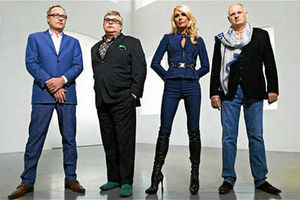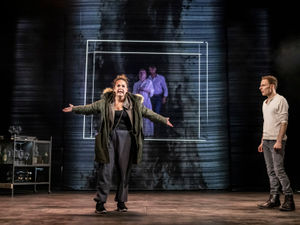Four Rooms - TV review
Way back in 1987, Oliver Stone's Wall Street captivated the collective imagination of cinemagoers.

Way back in 1987, Oliver Stone's Wall Street captivated the collective imagination of cinemagoers.
It was a time of the yuppie, of vulgar shoulder pads and chunky mobile phones you could use as weights at the gym. It was the time of Gordon Gekko.
It is 25 years since Michael Douglas played the character who uttered the now legendary words: "Greed, for lack of a better word, is good. Greed is right. Greed works". It appears greed is as relevant today as it was a quarter of a century ago, epitomised beautifully in last night's Four Rooms.
In a nutshell, members of the public bring in an item/collection and choose which of the four dealers they wish to see to thrash out a deal. Once a deal is declined the seller cannot revisit that dealer.
The Channel 4 show is as curious as some of the items brought before the dealers. Try to imagine Antiques Roadshow and Dragons' Den blended into a smooth cocktail and you are getting there.
And just like in Dragons' Den, the four characters with the wedge of cash to spend are no pushovers. Andrew Lamberty, a Lloyd Grossman look-a-like, only buys the very best; Celia Sawyer, vampish celebrity dealer and designer; Jeff Salmon, a veteran in the industry, uses dice to make decisions on price, and finally, Gordon Watson, a man with an eye for the rare and beautiful.
Last night's items included original poster artwork for Quentin Tarantino's violent 1993 blockbuster, Reservoir Dogs. Rescued from a skip by a nervous looking Bruce Winter some years ago, he was looking to achieve thousands of pounds for his freebie. Greedy boy. And who can blame him?
After a brief 'confrontation' with diceman Salmon, Bruce strikes a deal with Watson to the tune of £3,850. Not bad for something salvaged.
However, Sawyer revealed she would have paid £5,000. The tremble in Bruce's reaction was priceless. Such greed is what makes these shows such compulsive viewing.
Enjoyment in other folks disappointment is human nature. An episode of classic comedy The Royle Family illustrated this perfectly. Jim and his slobbish household, while huddled around a TV watching Antiques Roadshow, gloat at the pained expressions of those receiving tiny valuations.
Ah yes, greed is good.
Matt Thomas, a space enthusiast, brought along a prototype spacesuit from the late 1950s. He paid around £1,300 at auction for it. He wanted a five-figure sum. Cheeky!
Having rejected low offers from three of the dealers, Matt would not reveal to Jeff how much he wanted for the suit. Following a frustrating war of words, Matt exited the room without an offer. "That's a pity," said Jeff. "I would have paid £20 to £25,000 for that." Oops. Houston, we have a problem.
That's one small slip up for Matt, one giant leap for joy from the audience.
The dealers don't seem immune from bad decisions. Anne Copley, a Beatles fan, brought in four tiles that appeared on the reverse of the sleeve of The Abbey Road album. The tiles were rescued by Anne when the wall they once marked was demolished. Who knows what market there may be for the damaged letters of A, B, E and Y. Hopefully another tile might turn up. Let It B? - Sorry.
Amazingly, Anne talked Andrew up from his initial bid of £3,000 to a staggering £7,000. Good luck with selling those on.
Watch designer Peter Radcliffe wanted to off-load a mink coat, once owned by Richard Burton. The coat had been a 43rd birthday gift from Burton's then wife Elizabeth Taylor, who he married twice.
Celia paid a whopping £26,000 for the not-so-politically correct item. But this was not the vilest of the night's offerings.
Bizarre and offensive in equal measure, the dealers were asked to bid on Ku Klux Klan uniforms, part of Andy Jones's amassed collection. Jones owns a private crime museum which contains a selection of racist memorabilia – including nazi and fascist items in the Forest of Dean. The unmistakable cloaks and hoods were all the more disturbing as one of them was clearly made for a child.
The dealers were morally troubled with the items, and all decided to pass. Except Jeff. He offered Andy £1,000 to return the adult uniform to his collection, providing he agreed to cut up the children's version.
A clever ploy which, sadly, Andy declined. Clearly, not everything has a price – not a monetary one at least.
Paul Naylor





